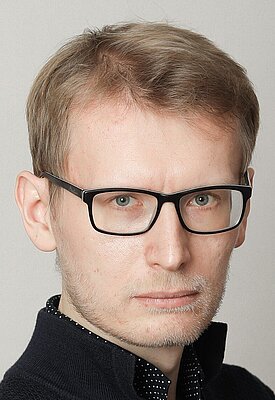Dr. Łukasz Bertram
Associated Researcher

Dr. Łukasz Bertram
Associated Researcher
| Office | RECET, Spitalgasse 2, Hof 1.1 |
|---|
Sociologist and historian. Assistant professor at the Institute of Political Studies, Polish Academy of Sciences. He specializes in studying the individual experiences of being a communist in the first half of the 20th Century. He is the author of the book Bunt, podziemie, władza. Polscy komuniści i ich socjalizacja polityczna do roku 1956 [Rebellion, Underground, Power. Polish Communist and their Political Socialization until 1956], awarded with the POLITYKA Historical Award (2023).
Research interests:
- Communist movement
- Political elites and structures
- Political and social history of Poland 1918–1956
- Agency and subjectivity of the individuals in politics
- Political experience of the popular strata
Current research project:
County revolution or revolution in a county? Biographies and Practices of Political Actors in the Warsaw Voivodship, 1944–1956
The objective of the project is to analyse political, social and economic processes taking place in Poland after the Second World War from the perspective of the individual political actors of that time: members of the local party, national councils and administrative elites in the Warsaw Voivodship, i.e. excluding the capital city of Warsaw. The chronological frames cover the period between the summer of 1944 and the autumn of 1956.
The project is based on two main pillars. The first one is an analysis of the political experience of the abovementioned group – this key category is understood here as events occurring throughout a biography of an individual and how one faces and interprets them; therefore – both objective and subjective aspect of one’s biography. My aim is, among others, to recognise how these actors understood the processes and notions such as “revolution”, “socialism”, “modernity”, as well as their attitudes, strategies and emotions. The second pillar will consist of examining the practices of local political actors confronted with issues such as violence and terror, social advancement, land reform and the collectivisation, strenuous industrialisation, social resistance against the authorities, the search for an "internal enemy", Stalinist norms of vigilance and mobilisation etc.
Two preliminary hypotheses can be outlined here. The first is that the study of the experience of local activists and officers is situated between the perspective of social history on "ordinary people" deeply rooted in their social backgrounds and milieus, and the perspective of political history on actors somehow separated from that context by their participation in exercising power. The second hypothesis assumes that the analysed reality of the Warsaw Voivodship will appear as a complex and dynamic process of interweaving compatibility and tensions between the top-down (or “from above”) and bottom-up or (“from below”) factors, between "communism/revolution in a county" and "county communism/revolution".
The project is founded by the National Science Centre (SONATINA program, 2020/36/C/HS3/00089).
Selected publications:
Bunt, podziemie, władza. Polscy komunisci i ich socjalizacja polityczna do roku 1956 (Wydawnictwo Naukowe Scholar, Instytut Studiów Politycznych PAN, Warszawa 2022.
Remembering on Command. Autobiographical Narratives of the Officers of the Polish Security Forces, 1944–1956, „East European Politics and Societies”, 2023, online first.
"Zna dobrze i nie zapomina duszy robotnika". Akta osobowe działaczy politycznych i historia ludowa, „Kultura i Społeczeństwo”, 2/2022: 213–233.
Degrees in Revolution and for Revolution’s Sake. The Educational Experience of Polish Communists Before 1939, „Acta Polonia Historica”, vol. 123, 2021: 215–237.
To run? Where? And from what? The Experience of Stalinist Repressions in the Biographies of the Members of the Polish Party-government Elite, 1949–1956, „Adeptus”, 12/2018: 1–26.